World
Trump Imposes 100% Tariffs on China as U.S.–China Trade War Reignites
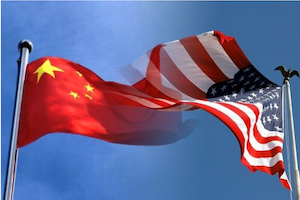
U.S. President Donald Trump announced that starting November 1, his administration will impose a new 100% tariff on Chinese goods and introduce export controls on “critical software” in retaliation for China’s latest restrictions on rare earth exports. The move marks a renewed escalation in U.S.–China tensions after several months of tariff truce.
On October 9, Beijing unveiled two new regulations imposing export controls on rare earth materials and related technologies. Under the new rules, any product containing more than 0.1% of Chinese-produced rare earth materials must obtain export approval, while companies linked to foreign militaries will be denied permits in principle. The measures are seen as China’s counter to U.S. chip export restrictions and could disrupt global supply chains for AI, semiconductors, and electric vehicles.
The announcement triggered market turmoil, with the Dow Jones Industrial Average plunging nearly 900 points. Tech stocks led the decline, as Nvidia fell about 5% and AMD dropped 8%. Over the past six months, the U.S. and China have continued to impose various non-tariff barriers, with Washington expanding its export blacklist and Beijing launching investigations into U.S. firms such as Qualcomm and Nvidia.
Trump had been scheduled to meet Chinese President Xi Jinping during the upcoming APEC summit, but he hinted on social media that the meeting could be canceled after criticizing China’s new export restrictions. However, he also noted that the new tariffs could still be withdrawn before taking effect. Analysts say Beijing’s move may be aimed at strengthening its leverage ahead of the summit. While both sides remain open to dialogue, the latest clash highlights the fragility and high volatility of U.S.–China relations.
- 36 reads
2025 Nobel Peace Prize Awarded to Venezuelan Opposition Female Activist
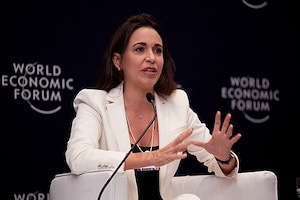
The 2025 Nobel Peace Prize was announced on the 10th of October and was awarded to 58-year-old Venezuelan opposition leader **María Corina Machado**, in recognition of her being a "brave and mission-driven woman" dedicated to helping the people of Venezuela fight for their democratic rights and for her tireless struggle for democracy.
Machado, a member of the opposition party, ran for president in 2024 but was disqualified by the Supreme Court. She ultimately supported an alternative candidate, **González**. However, after the incumbent president **Nicolás Maduro** declared re-election and González was forced into exile in Spain, Machado chose to remain in the country. Despite the harsh political climate and constant surveillance, she went into hiding and continued her fight for Venezuela’s freedom.
The Nobel Committee stated that Machado inspired millions, uniting deeply divided opposition parties and fostering consensus, all while promoting the common goal of “free elections and popular sovereignty.” This, they noted, is the essence of democracy—and particularly valuable in an era when democratic values are under threat worldwide. Nobel Committee Chair **Berit Reiss-Andersen** emphasized that the selection was based on Nobel’s will: "on courage and integrity, not political lobbying or media attention."
Upon learning she had won, Machado admitted she was shocked, and quickly thanked the committee, saying: *“This is an achievement of an entire society. I am just one person—I am absolutely unworthy.”*
In response to former U.S. President **Donald Trump** not receiving the prize, White House spokesperson **Steven Cheung** commented on social media that the committee had “once again proven they prioritize politics over peace,” and emphasized that Trump would continue to work toward peace and ending wars.
- 35 reads
Israel and Hamas Sign Ceasefire Agreement: Troop Withdrawal from Gaza in Exchange for Hostages

According to media reports, under strong pressure from U.S. President Trump, Israel and Hamas signed a ceasefire agreement on the 8th. The deal includes troop withdrawals, a hostage-prisoner exchange, and the opening of humanitarian aid access into the Gaza Strip. The news sparked widespread celebrations among both Israelis and Palestinians, with families of the hostages moved to tears.
The report stated that Trump expressed his gratitude to mediators from Qatar, Egypt, and Turkey for facilitating this unprecedented event in history. He said this was a great moment for the Arab and Muslim world, for Israel, neighboring countries, and the United States. Under the peace and ceasefire agreement, Hamas will release all hostages, and Israel will gradually withdraw its troops from Gaza. Israeli Prime Minister Netanyahu and senior Hamas officials have both confirmed progress on the ceasefire deal.
The report also noted that following the signing of the Gaza ceasefire agreement, 20 Israeli hostages who had endured two years of hardship will finally be able to return home. Additionally, 2,000 Palestinian prisoners will be released. The United Nations will begin providing aid, with Deputy Secretary-General Fletcher stating that hundreds of trucks carrying humanitarian supplies will enter Gaza daily. Efforts will also be made to restore healthcare, water supplies, and schools to help the people of Gaza rebuild their lives.
- Read more
- 50 reads
Brutal Airstrike by Myanmar Military Junta Kills and Injures at Least 71 Civilians

On the evening of October 6, during Myanmar’s traditional Buddhist festival known as the Thadingyut Festival, around a hundred people gathered in the central town of Chaung-U. The gathering was both a cultural celebration and a protest against the military junta’s policies. According to officials from the anti-junta People’s Defence Force (PDF), there had been intelligence of a potential airstrike, but there was not enough time to cancel the event.
The protest site was attacked by the military using a paramotor (powered paraglider), which dropped two bombs on the crowd, resulting in severe casualties.
According to a report by the BBC, the explosions were extremely powerful, killing at least 24 people and injuring 47. Since the military coup in 2021, the junta has faced armed resistance from ethnic militias and various armed groups, resulting in thousands of deaths and millions displaced. Having lost control of over half the country, the junta has increasingly resorted to airstrikes and bombings to suppress resistance. This airstrike is just one of hundreds of similar attacks.
In recent months, the junta has acquired numerous Chinese drones and received technical support from Russia. While Beijing supports the junta, it has also pressured rebel groups along the China-Myanmar border to stop supplying arms to resistance forces, leading to the rebels’ withdrawal from several territories.
Joe Freeman, a researcher at Amnesty International, condemned the attack and called on the Association of Southeast Asian Nations (ASEAN) to increase pressure on the military junta. Although the junta has announced its first general election will be held in December, the fairness of the election has been widely questioned. The attacked protest aimed to peacefully oppose military conscription and the upcoming national election. Protesters also called for the release of political prisoners, including Aung San Suu Kyi, who was ousted and imprisoned following the coup.
- Read more
- 39 reads
French Political Crisis Unresolved: New Prime Minister Resigns After Just 27 Days in Office
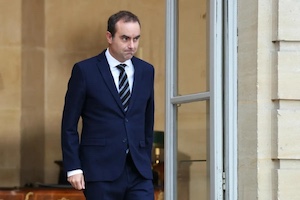
France’s newly appointed Prime Minister Gabriel Le Cnuc, who had just formed his cabinet, was scheduled to hold his first cabinet meeting on the 6th. However, in a surprising turn of events, Le Cnuc held a press conference early that morning to announce his resignation.
Le Cnuc stated, “The positions of the various political parties remain unchanged. Apart from myself, who was willing to compromise, the other parties insist on having their proposals fully accepted by others.”
The French political scene has once again been thrown into turmoil. The resignation of the new prime minister after only 27 days in office has drawn significant domestic and international attention. This sudden political storm has once again highlighted the deadlock between the presidency and parliament, casting a shadow over France’s future policy-making.
According to a statement from the Élysée Palace, the Prime Minister officially submitted his resignation on the evening of the 7th, citing the lack of a stable majority in parliament and the difficulty in advancing policies. The President accepted the resignation after a brief consultation and emphasized that a new prime minister would be appointed as soon as possible to maintain normal government operations. However, many observers believe the sudden resignation is a result of long-standing internal divisions within the ruling party and strong resistance from the opposition.
Following the announcement, Paris’s financial markets experienced temporary turbulence, and the euro weakened in the short term, reflecting shaken investor confidence due to political instability. Several media outlets noted that the prime minister’s resignation after less than a month in office marks one of the shortest tenures in the history of France’s Fifth Republic. Opposition leaders seized the opportunity to criticize the President for a “lack of leadership” and called for the immediate dissolution of parliament and fresh elections.
Analysts pointed out that the crisis stems from a hung parliament following the recent elections. The ruling party failed to secure a majority and was forced to negotiate and compromise with various factions. Although the new prime minister had pledged “cross-party cooperation,” repeated rejections of tax reforms and social welfare bills stalled governance and paralyzed the administration. Facing continued setbacks in parliament, the prime minister felt powerless and ultimately chose to step down.
Public opinion in France has generally expressed dissatisfaction with the political deadlock. Interviewed citizens bluntly stated that whoever takes office should “focus on the economy and people’s livelihoods first,” rather than being trapped in partisan conflict. Recent polls show that up to 60% of French citizens believe the government has become inefficient and express widespread distrust toward politicians.
The European Union is also closely monitoring the situation. Officials in Brussels are concerned that prolonged instability in France—a core EU member—could affect regional economic cooperation and security policies. The German government has called on France to restore political stability as soon as possible, stressing that “Europe needs a strong Paris.”
Currently, attention is focused on who the President will nominate as the next prime minister. Rumored candidates include a former finance minister, a senior diplomat, and several regional leaders. The President is reportedly leaning toward choosing someone with cross-party appeal to help bridge the divide with parliament. However, most observers agree that regardless of who the new prime minister is, without changes to the current parliamentary structure, the political crisis will be difficult to truly resolve.
- 90 reads
Nobel Prize in Medicine Awarded to Three Researchers from the U.S. and Japan

The 2025 Nobel Prize in Physiology or Medicine was announced on October 6 in Sweden and jointly awarded to three scientists — Mary E. Brunkow and Fred Ramsdell of the United States, and Japanese immunologist Shimon Sakaguchi. The Nobel Committee recognized their pioneering discoveries in the field of peripheral immune tolerance, confirming the existence of regulatory T cells, a breakthrough that has had profound implications for autoimmune diseases, cancer therapy, and organ transplantation.
The three laureates’ research centers on regulatory T cells (Tregs), a subset of immune cells that prevent the immune system from attacking the body’s own tissues, thus maintaining immune balance. In 1995, Shimon Sakaguchi first identified the existence of these cells, challenging the prevailing belief that immune tolerance stemmed solely from the elimination of self-reactive immune cells in the thymus—a process known as central tolerance. In 2001, Brunkow and Ramsdell further discovered the link between mutations in the Foxp3 gene and the autoimmune disorder IPEX syndrome, demonstrating that this gene is essential for the development of regulatory T cells.
According to the Nobel Committee, this groundbreaking work has deepened humanity’s understanding of the immune system and opened new frontiers in clinical medicine. Several therapies based on their discoveries are now in clinical trials and may eventually enhance the effectiveness of cancer immunotherapies, improve organ transplant success rates, and treat various autoimmune diseases.
The three laureates are affiliated with the Institute for Systems Biology in Seattle, the Immunology Frontier Research Center at Osaka University, and the U.S.-based biotechnology firm Sonoma Biotherapeutics. Their cross-national collaboration and enduring commitment to research embody the spirit of this year’s Nobel Prize.
- 31 reads
Sanae Takaichi Faces Three Major Challenges After Winning LDP Leadership; Japanese Media Warn of a “Short-Lived Administration”
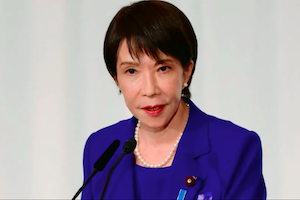
Japanese media reported on Saturday (October 4) that the Liberal Democratic Party (LDP) has elected its first female president, Sanae Takaichi, who is expected to become Japan’s first female prime minister by mid-October. While the public holds high expectations for her leadership, analysts warn that Takaichi will face numerous challenges, including restructuring party factions, building cooperation with opposition parties, and restoring public trust in the LDP.
According to Yomiuri Shimbun, Takaichi defeated the highly popular Minister of Agriculture, Forestry and Fisheries, Shinjiro Koizumi, to secure the LDP’s top post — a historic milestone in Japanese politics. However, after consecutive defeats in the House of Representatives, the Tokyo Metropolitan Assembly, and the House of Councillors elections, the party’s morale has plummeted. Reuniting the LDP through strategic personnel appointments will be Takaichi’s first major task.
Key figures under consideration for major party and cabinet positions include Shinjiro Koizumi, Finance Minister Katsunobu Kato, Aso faction’s Policy Council Chairperson Shunichi Suzuki, and former Policy Research Council Chairperson Koichi Hagiuda as potential candidates for LDP Secretary-General. Possible contenders for Policy Research Council Chairperson include former Economic Security Minister Takayuki Kobayashi and Election Strategy Committee Chairperson Seiji Kihara, a close ally of former Prime Minister Fumio Kishida. Since the LDP currently lacks a majority in both houses of the Diet, collaboration with opposition parties will be crucial. The role of Diet Affairs Committee Chairperson is expected to be pivotal, with former Deputy Finance Minister Nobuhide Mikazuki and current Secretary-General Hiroshi Moriyama among the likely candidates.
Takaichi must also confront the lingering impact of the “dark money” scandal that erupted in late 2023, which led to the dissolution of major party factions. During the leadership race, she received strong backing from the former Abe faction, but if she appoints lawmakers previously entangled in the scandal, public backlash could quickly resurface.
Although the LDP’s election of a female leader has been hailed as a breath of fresh air, real power within the party remains concentrated among veteran heavyweights — former prime ministers Taro Aso, Fumio Kishida, and Yoshihide Suga. Analysts note that Takaichi’s victory was largely secured thanks to the Aso faction’s support in the second round of voting. If she relies too heavily on these party elders and fails to pursue bold reforms, public trust in the LDP may erode further.
On foreign policy, Takaichi’s reputation as a hardline conservative could strain Japan’s relations with China and South Korea and potentially alienate the LDP’s coalition partner, Komeito. Observers caution that if she cannot strike a balance between domestic reform and diplomatic pragmatism, her administration may follow the path of previous short-lived governments.
- 106 reads
Unidentified Drones Intrude Across Europe; France Prioritizes Air Defense with Round-the-Clock Vigilance
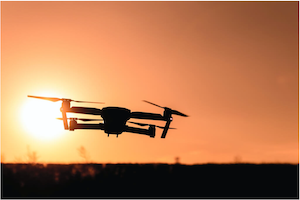
Several European countries — including Denmark, Norway, Poland, Romania, Belgium, and Germany — have recently reported incursions by unidentified drones targeting airports and military bases. Although France has not yet experienced similar incidents, its Ministry of Defense emphasized that counter-drone operations have become a key priority of national air defense, with more than 70 radars deployed across the country and about 450 pilots on constant 24-hour alert.
France’s air defense system operates under a “permanent air defense posture,” capable of intercepting suspicious aircraft within minutes. The military handles large drones, while smaller ones fall under civilian authorities. Defense measures include radar networks, electro-optical tracking systems, electronic jamming, and fighter jet interceptions. The military is also testing laser and microwave counter-drone technologies. According to the Defense Ministry, during the 2024 Paris Olympics, France detected nearly 400 drones and neutralized over 100 potential threats, demonstrating its robust defensive capabilities.
Étienne Marcuz, a researcher at the Foundation for Strategic Research (FRS), told Le Figaro that if the drone incursions were indeed orchestrated by Russia, they could be interpreted as an intimidation tactic aimed at testing the European Union’s unity and proving that all European countries — not only those in the east — are vulnerable to attack.
At the EU summit in Denmark, President Emmanuel Macron stated that Europe has the right to destroy drones violating its airspace. He also announced plans to convene a meeting of European chiefs of staff to discuss countermeasures against Russia’s so-called “ghost fleet.” Recently, the French Navy intercepted an oil tanker off the country’s western coast suspected of helping Russia evade sanctions. Danish media speculated that the same vessel might have served as the platform for drones that disrupted Danish airspace in late September.
- Read more
- 92 reads
Trump Announces U.S. is at War with Drug Cartels
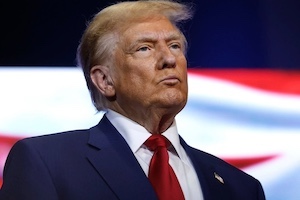
Multiple U.S. media outlets reported that on the 2nd, President Donald John Trump submitted a classified report to Congress, stating that the United States is currently at war with drug cartels designated as terrorist organizations. According to the report, the situation has reached a critical point, and the U.S. must resort to military force in self-defense. Venezuelan Defense Minister Vladimir Padrino López responded by saying that five U.S. fighter jets were detected near the Venezuelan coast, calling it an act of illegal intrusion and provocation that seriously endangers aviation safety in the Caribbean region.
The classified report, delivered to congressional committees by the Pentagon, aims to justify the legality of attacking drug cartels. It includes details of Trump’s September order to carry out operations in the Caribbean against illegal vessels. However, the report does not specify the names of the cartels involved in armed conflict with the U.S., nor the dates or regions affected. It does state that those killed in the operations were classified as unlawful combatants, drawing significant public concern.
In September, U.S. drones were used to sink at least three suspected smuggling vessels off the coast of Venezuela, resulting in at least 17 deaths. This has sparked widespread criticism regarding the legality of using military force against drug trafficking suspects, with accusations that Trump is abusing presidential power. Both Democratic and Republican senators and representatives have voiced strong opposition, urging that the administration act in accordance with the War Powers Act and refrain from using military force without congressional authorization.
Venezuelan Defense Minister López issued a strong statement condemning the U.S., saying that on the day of the conflict, at least five U.S. military aircraft were detected in the Maiquetía Flight Information Region. Although some of the aircraft did not enter Venezuelan airspace, their presence posed a serious threat to Venezuela’s national sovereignty, violated international law, and breached the International Civil Aviation Convention. He added that Venezuela would appeal to the United Nations, the International Civil Aviation Organization, and Latin American and Caribbean nations to take necessary measures to prevent such actions from happening again.
- Read more
- 79 reads
U.S. Federal Funding Bill Stalemate Shuts Down Government Again; Trump Seizes Opportunity to Undermine Democrat-Led States
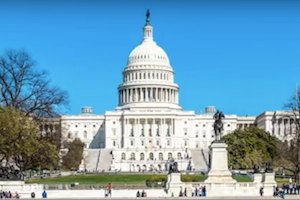
The U.S. federal government has once again shut down after lawmakers from both parties vetoed each other’s proposals to extend federal funding. With Congress in recess for Yom Kippur, the earliest possible time to reschedule a vote is October 3. As a result, government departments are once again left in limbo, and reports indicate the White House may initiate a new round of federal employee layoffs within the next couple of days.
President Donald Trump stated on September 30 that he intended to use a government shutdown to target Democratic priorities and institutions. Russell Vought, Director of the Office of Management and Budget (OMB), said the administration aims to halt funding for infrastructure projects in Democrat-led states, announcing the cancellation of $8 billion in green energy programs and warning that funding for the Women, Infants, and Children (WIC) nutrition assistance program will be cut.
Federal funding for two major New York infrastructure projects—the Second Avenue Subway and the Hudson Tunnel to New Jersey—amounting to roughly $18 billion, has also been frozen. Decisions on which services will continue to operate will be based on safety considerations and remaining budget resources, as determined by the President and the OMB.
During Trump’s first term in 2018, the government experienced its longest-ever shutdown, lasting 35 days. The impasse ended only after Trump compromised on funding for the U.S.–Mexico border wall. Historically, all federal shutdowns have resulted from bipartisan negotiation failures, with federal employees being the most directly affected. Around 420,000 workers are forced to work without pay, while 380,000 are furloughed. Although back pay is often issued afterward, the shutdowns still cause widespread disruption to people’s lives.
- 76 reads
Human Rights
Fostering a More Humane World: The 28th Eurasian Economic Summi

Conscience, Hope, and Action: Keys to Global Peace and Sustainability

Ringing FOWPAL’s Peace Bell for the World:Nobel Peace Prize Laureates’ Visions and Actions

Protecting the World’s Cultural Diversity for a Sustainable Future

Puppet Show I International Friendship Day 2020

